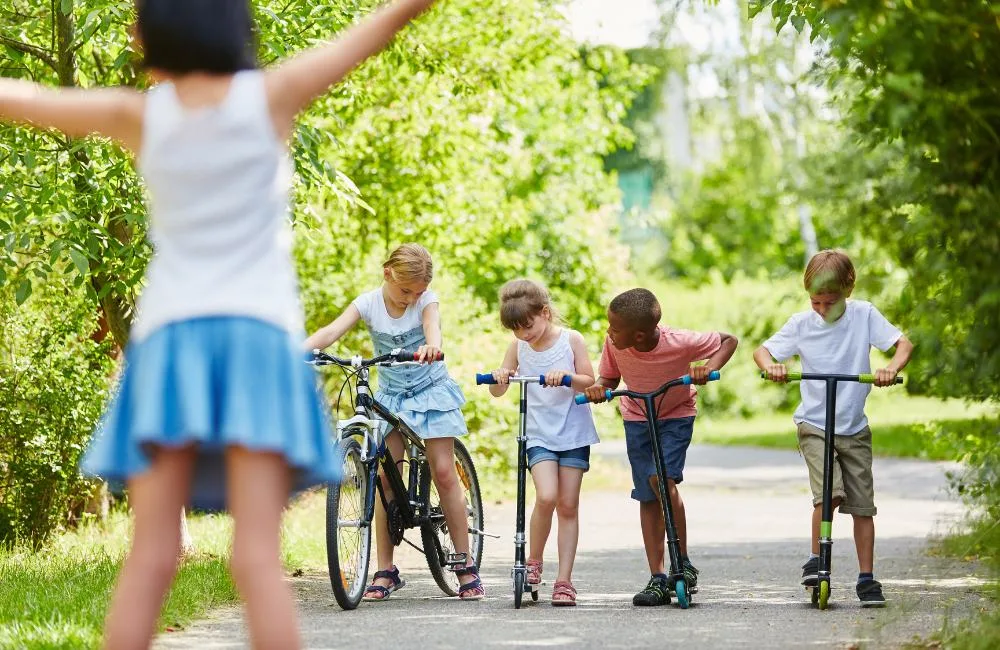
Photo Credit: Canva
By using this site, you agree to our Terms of Use. This post may contain affiliate links. Read our disclosure policy.
These tips can help you learn how to teach your kids to choose good friends. Great friends are so important for kids when growing up!
Every parent wants their kids to grow up and make wise decisions about who they spend time with. Your child needs to learn what qualities a good friend has and how they can spot potential bad influences that might come into their life.
Teaching them the importance of emotional intelligence when choosing friends wisely is an essential lesson that will have a lasting effect on them as adults.
In this post, we’ll talk about what you should do if your child is being bullied, why parents must teach these lessons early on in their children’s lives, and share some tips for teaching kids how to choose good friendships.
What you should do if your child is being bullied
Some of you may know and probably agree with me on this – children who bully other children are the worst. They’re mean; they don’t seem to care for anyone but themselves.
Those involved with bullying feel isolated, frequently lack self-esteem, and usually suffer from depression because they lack friends. It is one of the main reasons why so many bullies commit suicide every year, and those bullied are twice as likely to consider suicide.
I hope that this doesn’t become the norm, that children will learn to think of others before themselves.
So if your child is being bullied, here’s what you should do:
- Step in. Take action, don’t let it go.
- Be supportive of your child. Show them that you are there for them unconditionally.
- Please don’t make any accusations or assumptions about the person who’s bullying your child. Listen to your child and what they have to say. It should be done in a private setting.
- If you know who’s bullying your child, talk to the parents.
- If you don’t know who’s bullying your child, contact their school. If you’ve already done that and this person is still not reprimanded for their actions, contact the school board or administration.
- Don’t make a big deal about it. If you begin to act too aggressively towards the parent or the school, it will only make them more defensive, and they will, of course, not change.
- Talk with your child about bullying and how their behavior might be leading to this kind of treatment.
The best way to prepare your kids in making the right decisions
The best way to teach kids is by showing them examples of good and bad friendships. Doing so will help them learn how to differentiate between healthy friendships and friendships that should be avoided.
You don’t have to go into detail. Instead, explain how your parents taught you what type of friends were worth making or not worth. What they told you about these people was usually correct if you think about it.
It would be best if you taught them how friends are supposed to treat each other. For example, being a good friend means that your friend would never use or take advantage of you, that he does not spread rumors about people behind their backs, and that he is always there for you when you need him.
You can teach your child a lot about friendship just by observing how others interact with one another. If they are being mean to each other or taking their anger out on others, your child should know not to do that. Being a friend means being kind and respectful of others. If you teach your child this, they will be on their way to making the right types of friends.
On the other hand, if you never let your child get into any trouble, then she/he won’t be able to differentiate between good and bad friendships because they probably won’t ever encounter one until they are much older. Therefore, the sooner they understand what a good friendship is, the better chance they have of making friends in their lives for a long time.
Teaching children how to choose good friendships from bad ones is very effective because you give them knowledge rather than just telling them not to do something. Also, if your child chooses well-behaved friends, you can be confident that s/he is learning from the best.
Why it’s important to teach your kids about choosing good friends
Teaching your kids about choosing good friends is a great way to help them avoid some of the problems that bad choices could lead to in their lives.
Most kids are very impressionable, and if they make friends with less-than-desirable types, they can be pulled down into negative behaviors. Kids who get involved in risky activities often do so because their friends encourage them to do it.
Just as your child’s friends can chip away at his moral fiber, they also have the power to build him up and make him reach his full potential. Your children will draw on these qualities when making decisions throughout life and even in choosing a career later on.
Teaching kids about choosing good friends does not mean you are telling them who to be friends with; instead, it means having a discussion with your children about what makes a good friend and how to spot those qualities.
By doing this, your kids will be able to make their own decisions about who they want to invite into their lives, and you won’t have to worry that they are going down the wrong path.
Tips for teaching your children how to choose a good friend
In this day and age, most children have to grow up with a lot of social pressure. As a parent, you will do everything in your power to make sure that your child can learn all they need to know to survive the real world.
With this in mind, here are some tips on how you can teach your child to make good friends:
- Teach your children to take time before deciding whether or not to make friends with someone. Please don’t allow them to make an impulsive decision about whether or not a person is worthy of their friendship.
- Teach your children that kids who are manipulative and full of themselves do not make good friends. If they hang out with manipulative and self-centered kids, then they might start thinking that this is how they should be.
- Teach your children that good friends don’t need to put someone down to build themselves up constantly. They will find that people who try to insult others usually keep doing it because they know the insults are true about them deep down.
- Teach your children that losers use violence or threats of violence to establish their position. They should never seek out friends like this, and if they see these things in action, they should leave the area quickly.
- Teach your children that losers often try to control someone’s friendship group. If a loser friend isolates them from the rest of the crowd, you need to teach them that this is not a person they need to be friends with.
- Teach your children that losers often make excuses for their behavior and always blame others. The truth is, they are simply trying to insulate themselves from criticism. If your child sees such behavior in action, encourage them to question why the loser behaves like this and look for an intelligent answer.
- Teach your children that losers often get into trouble and, instead of telling the truth about what happened, they try to cover things up. They know what they did was wrong and don’t want to be held responsible for their actions. Your child should learn how to spot this behavior in action and do what they can to encourage the loser in question to tell the truth.
- Teach your children that losers often don’t keep their promises. If they make a verbal agreement with them, they should hold them accountable and see what happens when it isn’t kept. This behavior can be used to explain why they are bad friends; your children should also think about what this says about the loser’s character.
- Teach your children that losers often use other people’s weaknesses to get ahead of them. If they are ever faced with evidence of such behavior, you need to teach them how to set boundaries and not allow themselves to be used in such a way; they will eventually see that friends like this will never be looked up to.
- Teach your children that losers often blame others for their mistakes and problems. They usually try to pass the buck when things don’t go their way. If your child is ever faced with such behavior, teach them not to get involved with it and walk away from such people themselves.
Choosing friends is an important decision, and it’s one that your children will have to make on their own someday. Teaching them how to do so now can help them avoid the pain of being bullied or feeling left out when they are older.
It may seem like a daunting task, but there are ways you can teach your kids about choosing good friends without seeming too preachy or overbearing. To get started, introduce the idea of what makes for good friendships by asking questions such as “What should be qualities in a friend?
Check out more Parenting Articles
5 Easy Ways To Raise Helpful Kids: Start Them Young
10 Things I Want To Tell New Parents
Positive Parenting: How Do I Fix Positivity In My Kids At An Early Age
